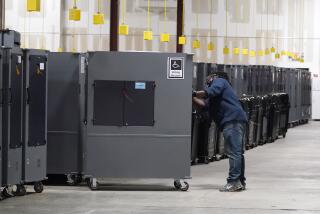Wal-Mart may pay millions to resolve Mexican bribery allegations
- Share via
Wal-Mart Stores Inc. could end up paying hundreds of millions of dollars in legal expenses and penalties to resolve allegations of widespread bribery by officials with its Mexican subsidiary, experts in foreign corruption law said.
The world’s largest retailer said it was in the midst of a “worldwide review of our anti-corruption program” and had increased efforts to prevent corruption in Mexico. The Bentonville, Ark., company is looking into allegations that it engaged in a multiyear bribery campaign to build its business.
The allegations come at a time when the Justice Department has been cracking down on foreign corruption. The agency filed some two dozen cases against U.S. companies in 2010, compared with none a decade earlier.
“You have an incredible amount of legal challenges that are going to take part as a result of these failures,” said James Post, a business management professor at Boston University. “The board of directors should bring in an outside firm to launch a full investigation. They have to open up the record on everything that’s happened here.”
He said Wal-Mart also faces shareholder lawsuits, along with criminal charges and potential action by the Securities and Exchange Commission.
Wal-Mart’s Mexican subsidiary might have paid $24 million in bribes in order to speed the approval of new stores in Mexico, according to a report from the New York Times. Wal-Mart operates more than 2,000 locations in Mexico, its largest foreign presence.
Investigations of foreign corruption by U.S. companies typically last two to four years and could cost tens of millions of dollars in legal expenses, said Michael Koehler, a Butler University professor.
The bribery allegations “will be used against the company by activists and companies when it attempts to open stores in the U.S. and abroad, and could make it more difficult to attract management talent in international markets,” BMO Capital Markets analyst Wayne Hood said.
Wal-Mart shares fell $2.91, or 4.7%, to $59.54 on Monday. Analysts said they fear that the investigation could become a distraction to the company and hamper foreign expansion.
The Foreign Corrupt Practices Act was enacted in 1977 after a series of investigations by the SEC, and hundreds of U.S. companies acknowledged making questionable or illegal payments to foreign government officials and politicians.
Enforcement of the law has become such a concern to business that the U.S. Chamber of Commerce has lobbied for changes. It says that the law is vague and might discourage business.
In Mexico, where Wal-Mart’s subsidiary also owns a vast network of supermarkets, family restaurants and clothing stores, the bribery allegations have led to local media coverage and pushed shares down 12% on the Mexican stock market.
Mexican regulators reacted cautiously to the allegations. In Washington for meetings, Finance Secretary Jose Antonio Meade said the government lacked sufficient evidence to move against the firm yet.
Luis Tellez, head of the stock market in Mexico, defended Wal-Mart’s performance. He said the retailer has met the market’s financial reporting requirements and boosted the Mexican economy by creating jobs.
“Without doubt it has generated wealth in terms of work, wages for its employees and in terms of giving Mexican consumers shopping opportunities at low prices,” Tellez said.
The allegations are sure to provide fuel for Wal-Mart detractors south of the border, where the rapid spread of U.S.-style big-box stores threatens traditional, small-time vendors. Critics have also questioned the value of the jobs created by Wal-Mart, saying most of those positions are poorly paid.
Few Mexicans, though, were likely to be shocked at charges that a company had paid bribes.
Mexico has one of the highest corruption indexes among the world’s big economies, and greasing the palms of officials is routinely viewed as another cost of doing business by even the most humble street vendor.
Times staff writer Ken Ellingwood in Mexico City contributed to this report.
More to Read
Inside the business of entertainment
The Wide Shot brings you news, analysis and insights on everything from streaming wars to production — and what it all means for the future.
You may occasionally receive promotional content from the Los Angeles Times.











